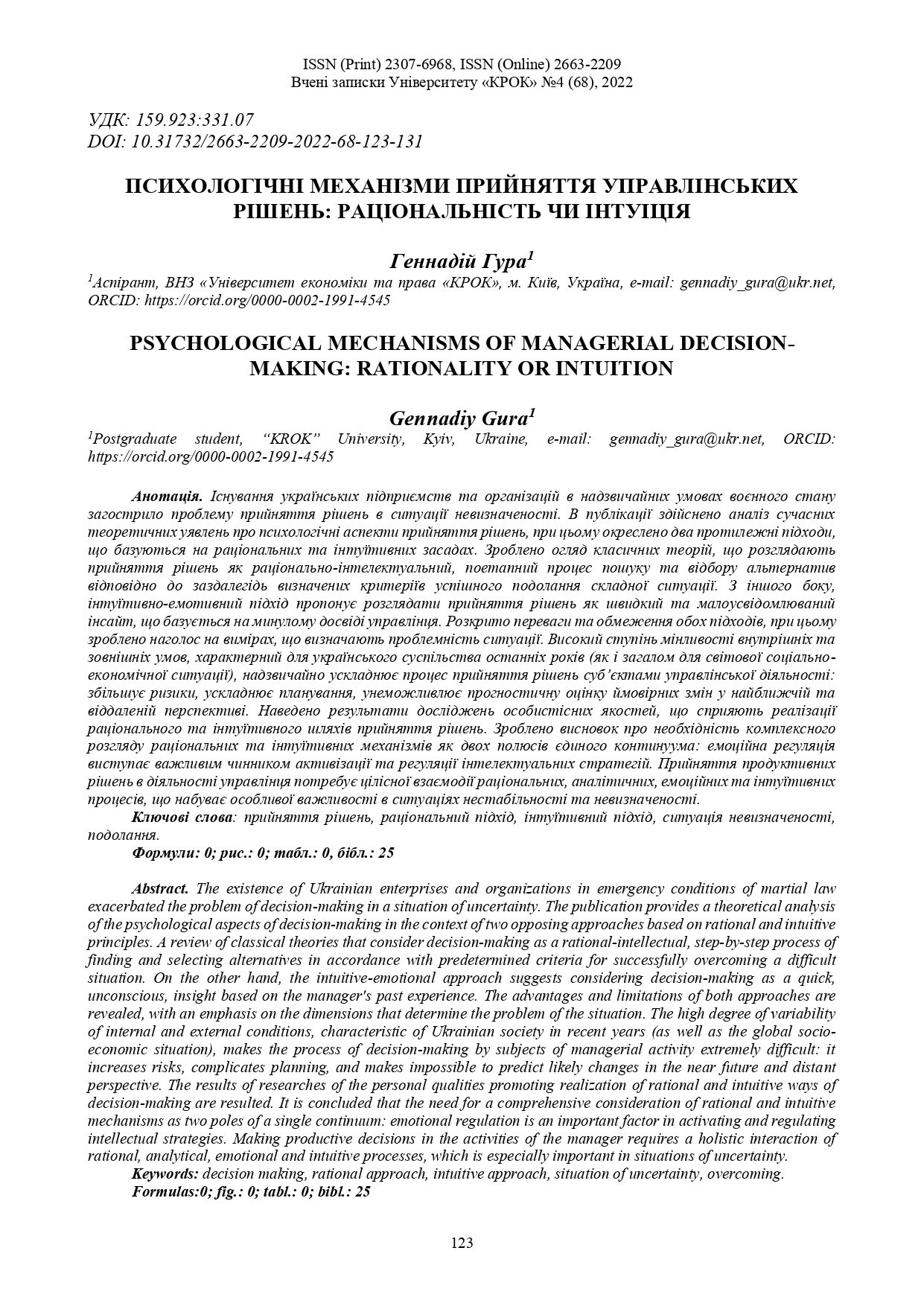PSYCHOLOGICAL MECHANISMS OF MANAGERIAL DECISION-MAKING: RATIONALITY OR INTUITION
DOI:
https://doi.org/10.31732/2663-2209-2022-68-123-131Keywords:
decision making, rational approach, intuitive approach, situation of uncertainty, overcomingAbstract
The existence of Ukrainian enterprises and organizations in emergency conditions of martial law exacerbated the problem of decision-making in a situation of uncertainty. The publication provides a theoretical analysis of the psychological aspects of decision-making in the context of two opposing approaches based on rational and intuitive principles. A review of classical theories that consider decision-making as a rational-intellectual, step-by-step process of finding and selecting alternatives in accordance with predetermined criteria for successfully overcoming a difficult situation. On the other hand, the intuitive-emotional approach suggests considering decision-making as a quick, unconscious, insight based on the manager's past experience. The advantages and limitations of both approaches are revealed, with an emphasis on the dimensions that determine the problem of the situation. The high degree of variability of internal and external conditions, characteristic of Ukrainian society in recent years (as well as the global socio-economic situation), makes the process of decision-making by subjects of managerial activity extremely difficult: it increases risks, complicates planning, and makes impossible to predict likely changes in the near future and distant perspective. The results of researches of the personal qualities promoting realization of rational and intuitive ways of decision-making are resulted. It is concluded that the need for a comprehensive consideration of rational and intuitive mechanisms as two poles of a single continuum: emotional regulation is an important factor in activating and regulating intellectual strategies. Making productive decisions in the activities of the manager requires a holistic interaction of rational, analytical, emotional and intuitive processes, which is especially important in situations of uncertainty.
Downloads
References
Артемов В. Ю., Сингаївська І. В. Особливості процесів прийняття рішень в умовах невизначеності. Вчені записки Університету «КРОК». 2022. № 1(65). С. 149–163. DOI: 10.31732/2663-2209-2022-65-149-163
Бутко М. П., Бутко І. М., Мащенко В. П. та ін. Теорія прийняття рішень / заг. ред. М. П. Бутка. К. : Центр учбової літератури, 2015. 360 с. URL: https://dut.edu.ua/uploads/l_101_88535923.pdf
Канеман Д.‚ Словик С.‚ Тверски А. Принятие решений в неопределенности: правила и предубеждения. Харьков : Фолио, 2005. 632 с.
Сингаївська І.В., Федорець С.Б. Психологічний аналіз поняття менеджменту та стилів управління. Правничий вісник Університету «КРОК». 2017. Вип. 29. С. 197-205. URL: http://nbuv.gov.ua/UJRN/Pvuk_2017_29_32
Czerlinski J., Gigerenzer G., Goldstein D. G. How good are simple heuristics? In G. Gigerenzer, P. Todd, and the ABC Research Group (eds.). Simple Heuristics That Make Us Smart . NY: Oxford University Press, 1999. Р. 97-118. URI: http://www.fulviofrisone.com
Epstein S. Integration of the cognitive and the psychodynamic unconscious. American psychologist. 1994. Vol. 49(8). Р. 709-724. DOI: 10.1037//0003-066x.49.8.709
Gigerenzer G., Gaissmaier W. Heuristic decision making. Annual Review of Psychology, 2011. Vol. 62. Р. 451–482. DOI: 10.1146/annurev-psych-120709-145346
Goldstein W. M., Hogarth R. M. Research on judgment and decision making: Currents, connections, and controversies. Cambridge University Press, 1997. 768 р.
Hammond K. R., Hamm R. M., Grassia J., Pearson T. Direct comparison of the efficacy of intuitive and analytical cognition in expert judgment. IEEE Transactions on Systems, Man, & Cybernetics, 1987. Vol. 17(5). Р. 753–770. DOI: 10.1109/TSMC.1987.6499282
Hogarth R. M. Educating Intuition. Chicago: The University of Chicago Press, 2001. 335 p.
Kahneman D., Tversky, A. On the study of statistical intuitions. Cognition, 1982. Vol. 11(2). Р. 123-141. DOI: 10.1016/0010-0277(82)90022-1
Keren G., Schul Y. Two is not always better than one: A critical evaluation of two-system theories. Perspectives on Psychological Science, 2009. Vol. 4(6). р. 500–533. DOI: 10.1111/j.1745-6924.2009.01164.x
Klein G. Developing expertise in decision making. Thinking and reasoning, 1997. Vol. 3(4). Р. 337–352. https://doi.org/10.1080/135467897394329
Klein G., Jarosz A. A Naturalistic Study of Insight. Journal of Cognitive Engineering and Decision Making, 2011. Vol. 5(4). Р. 335–351. DOI: 10.1177/1555343411427013
Lieberman M. D. Intuition: a social cognitive neuroscience approach. Psychological Bulletin, 2000. Vol. 126(1). Р. 109-137. DOI: 10.1037//0033-2909.126.1.109
Lieder F., Griffiths T. L., Huys Q. J., Goodman N. D. The anchoring bias reflects rational use of cognitive resources. Psychonomic Bulletin & Review, 2018. Vol. 25(1). Р. 322–349. DOI: 10.3758/s13423-017-1286-8.
Mega L. F., Gigerenzer G., Volz K. G. Do intuitive and deliberate judgments rely on two distinct neural systems? A case study in face processing. Frontiers in Human Neuroscience, 2015. Vol. 9. Article 456. URL: https://www.frontiersin.org/articles/10.3389/fnhum.2015.00456/full
Neumann J., Morgenstern O. Theory of Games and Economic Behavior: 60th Anniversary Commemorative Edition. Princeton, NJ: Princeton University Press. 2007. 776 р.
Osbeck L. M. Direct apprehension and social cognition: Revising the concept of intuition. Journal of Theoretical and Philosophical Psychology, 2001. Vol. 21(2). P. 118-131.
Shafir E., LeBoeuf R. A. Rationality. Annual Review of Psychology, 2002. Vol. 49. Р. 491-517. DOI: 10.1146/annurev.psych.53.100901.135213
Shirley D. A., Lagan-Fox J. Intuition: A Review of the Literature. Pscychological Reports, 1996. Vol. 79. Р. 563-584. DOI: 10.2466/pr0.1996.79.2.563
Simon H. A. Rationality as Process and as Product of Thought. Richard T. Ely Lecture. American Economic Review, 1978. Vol. 68(2). Р. 1–16. URL: https://www.jstor.org/stable/1816653
Simon H. A. Making management decisions: the role of intuition and emotion. The Academy of Management Executive, 1987. Vol. 1(1). Р. 57-64. URL: https://www.jstor.org/stable/4164720
Vaughan F. E. Varieties of intuitive experience. In W. H. Agor (Ed.). Intuition in organizations: Leading and managing productively. Newbury Park, CA: SAGE Publications. 1989. Р. 40-61.
Zilberstein S. Satisficing and bounded optimality. AAAI Spring Symposium on Satisficing Models. 1998. Р. 91–94. URL: https://www.aaai.org/Papers/Symposia/Spring/1998/SS-98-05/SS98-05-015.pdf

Downloads
Published
How to Cite
Issue
Section
License
Copyright (c) 2022 Геннадій Гура

This work is licensed under a Creative Commons Attribution 4.0 International License.

